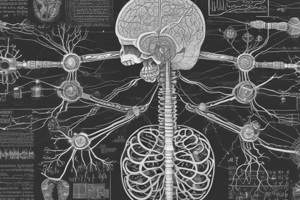Podcast
Questions and Answers
What is one of the recommended tips for better sleep?
What is one of the recommended tips for better sleep?
- Establish regular bedtimes and wake up times (correct)
- Consume large meals close to bedtime
- Engage in high-intensity exercise right before bed
- Increase screen time before going to sleep
Which of the following is an effective stress reduction technique?
Which of the following is an effective stress reduction technique?
- Practicing deep breathing exercises (correct)
- Watching TV for extended periods
- Consuming large amounts of caffeine
- Avoiding physical activity
What is one strategy recommended for memory enhancement?
What is one strategy recommended for memory enhancement?
- Engaging in activities like reading and puzzles (correct)
- Limiting social interactions
- Avoiding new experiences
- Watching television for long periods
Which nutrient is important for supporting brain health?
Which nutrient is important for supporting brain health?
How does exercise benefit brain health?
How does exercise benefit brain health?
Flashcards are hidden until you start studying
Study Notes
Nervous System Care: Importance of Sleep, Stress Management, Brain Health Tips, and Exercise for Brain Health
The nervous system is responsible for processing information from our senses, controlling movements, regulating body functions, and coordinating responses to internal and external stimuli. Taking proper care of our nervous system can help improve cognitive function, reduce the risk of neurodegenerative diseases, and enhance overall well-being. Here are some tips for maintaining a healthy nervous system through sleep management, stress reduction techniques, brain health strategies, and exercise.
Importance of Sleep
Benefits of Sleep
Getting adequate sleep is crucial for numerous aspects of nervous system care. Good sleep hygiene can lead to improved memory consolidation and learning, reduced inflammation, enhanced immune system function, and better mood regulation. Additionally, quality sleep has been linked with increased attention span, faster reaction times, and better decision making abilities.
Recommended Amount of Sleep
The National Sleep Foundation recommends that adults aged 18-64 get between 7-9 hours of sleep each night. Proper sleep duration is essential for maintaining optimal physical and mental health throughout the day.
Tips for Better Sleep
To promote restful sleep, establish regular bedtimes and wake up times each day, create a comfortable sleeping environment, avoid caffeine and alcohol consumption close to bedtime, and limit screen time before going to bed.
Stress Management Techniques
Identifying Stressors
Recognizing potential stressors is the first step in managing stress effectively. Common sources of stress include work pressure, family conflicts, financial difficulties, and relationship issues.
Stress Reduction Techniques
Effective stress reduction techniques include deep breathing exercises, progressive muscle relaxation, meditation, and yoga. These practices have been shown to reduce cortisol levels, lower blood pressure, and increase feelings of calmness and relaxation.
Brain Health Tips
Memory Enhancement Strategies
To maintain brain health and support memory enhancement, engage in activities such as reading, writing, playing musical instruments, solving puzzles, and practicing mindfulness meditation. Regularly challenging your brain with new experiences and tasks helps stimulate neuronal connections and maintain cognitive function.
Nutritional Support for Brain Health
Consume a balanced diet rich in antioxidants, vitamins, minerals, fiber, and healthy fats to support overall brain health. Foods like dark leafy greens, fatty fish, nuts, seeds, and vegetables should be incorporated into a daily diet for optimal cognitive functioning.
Exercise for Brain Health
Physical activity plays an important role in maintaining a healthy nervous system. Engage in regular exercise such as walking, jogging, swimming, cycling, or weight training to boost brain health. Physical activity has been shown to increase blood flow to the brain, promote neurogenesis, reduce inflammation, and enhance mood.
In conclusion, taking care of our nervous system involves prioritizing sleep, managing stress levels through relaxation techniques, implementing brain health strategies such as memory enhancement exercises and nutritious diets, and incorporating regular exercise into daily routines. By following these guidelines, we can support optimal cognitive function and overall well-being throughout life.
Studying That Suits You
Use AI to generate personalized quizzes and flashcards to suit your learning preferences.




